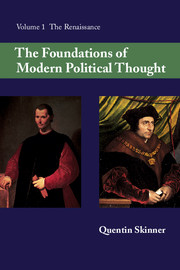Book contents
- Frontmatter
- Contents
- Preface
- Acknowledgements
- Notes on the text
- PART ONE THE ORIGINS OF THE RENAISSANCE
- 1 The ideal of liberty
- 2 Rhetoric and liberty
- 3 Scholasticism and liberty
- PART TWO THE ITALIAN RENAISSANCE
- PART THREE THE NORTHERN RENAISSANCE
- Bibliography of primary sources
- Bibliography of secondary sources
- Index
1 - The ideal of liberty
Published online by Cambridge University Press: 05 June 2012
- Frontmatter
- Contents
- Preface
- Acknowledgements
- Notes on the text
- PART ONE THE ORIGINS OF THE RENAISSANCE
- 1 The ideal of liberty
- 2 Rhetoric and liberty
- 3 Scholasticism and liberty
- PART TWO THE ITALIAN RENAISSANCE
- PART THREE THE NORTHERN RENAISSANCE
- Bibliography of primary sources
- Bibliography of secondary sources
- Index
Summary
THE CITY REPUBLICS AND THE EMPIRE
As early as the middle of the twelfth century the German historian Otto of Freising recognised that a new and remarkable form of social and political organisation had arisen in Northern Italy. One peculiarity he noted was that Italian society had apparently ceased to be feudal in character. He found that ‘practically the entire land is divided among the cities’ and that ‘scarcely any noble or great man can be found in all the surrounding territory who does not acknowledge the authority of his city’ (p. 127). The other development he observed – which struck him as even more subversive – was that the cities had evolved a form of political life entirely at odds with the prevailing assumption that hereditary monarchy constituted the only sound form of government. They had become ‘so desirous of liberty’ that they had turned themselves into independent Republics, each governed ‘by the will of consuls rather than rulers’, whom they ‘changed almost every year’ in order to ensure that their ‘lust for power’ was controlled and the freedom of the people maintained (p. 127).
The earliest known case of an Italian city electing such a consular form of government occurred at Pisa in 1085 (Waley, 1969, p. 57). Thereafter the system began to spread rapidly in Lombardy as well as Tuscany, with similar regimes appearing at Milan in 1097, at Arezzo in the following year, and at Lucca, Bologna and Siena by 1125 (Waley, 1969, p. 60).
- Type
- Chapter
- Information
- The Foundations of Modern Political Thought , pp. 3 - 22Publisher: Cambridge University PressPrint publication year: 1978
- 1
- Cited by



